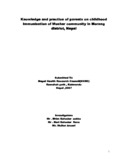Please use this identifier to cite or link to this item:
https://hdl.handle.net/20.500.14356/357Full metadata record
| DC Field | Value | Language |
|---|---|---|
| dc.contributor.author | Nepal Health Research Council (NHRC) | |
| dc.contributor.author | Subba, Bhim Bahadur | |
| dc.contributor.author | Rana, Hari Bahadur | |
| dc.contributor.author | Ansari, Muftar | |
| dc.date.accessioned | 2013-01-01T21:48:18Z | |
| dc.date.accessioned | 2022-11-08T10:14:29Z | - |
| dc.date.available | 2013-01-01T21:48:18Z | |
| dc.date.available | 2022-11-08T10:14:29Z | - |
| dc.date.issued | 2007 | |
| dc.identifier.uri | http://103.69.126.140:8080/handle/20.500.14356/357 | - |
| dc.description.abstract | Abstract: This study was carried out on Knowledge and practice of parents on childhood immunization of mushar community in 12 VDCs of Morang district, Nepal. The main objective of the study was to compare the parents’ knowledge and practice on childhood immunization of Mushar community. This study assessed specific knowledge and practice about immunization and children’s Health, and also analyzed cultural in relation to use of childhood immunizations among childbearing mothers in Nepal. Four hundred and three sample respondents were taken for assess the level of knowledge and practice on immunization. Of those surveyed, 53.3% male and 58.1 % female respondents reported being immunized. This percentage remarkably increased in their children immunization practice and 92.3% male and 94.0 % female respondents reported that all of their children were immunized, and 7.7% male and 6% female stated that none of their children were immunized. In addition, those parents with low levels of education were more likely to have higher immunization rates. Furthermore, qualitative findings indicated that parents reported benefits of immunizing children that appeared to be a major reason for their children’s immunization. The results of this study suggest that parents who have lived in city area like Biratnagar municipality may be at greater risk of not being immunized against vaccine preventable diseases and that health education interventions in this community may be more effective if they are focused on perceived benefits of immunization in the future intervention efforts. | en_US |
| dc.language.iso | en_US | en_US |
| dc.publisher | Nepal Health Research Council | en_US |
| dc.subject | Childhood Immunization | en_US |
| dc.subject | Mushar Community | en_US |
| dc.subject | Morang | en_US |
| dc.title | Knowledge and practice of parents on childhood immunization of Mushar community in Morang district, Nepal district, Nepal | en_US |
| dc.type | Technical Report | en_US |
| Appears in Collections: | NHRC Research Report | |
Files in This Item:
| File | Description | Size | Format | |
|---|---|---|---|---|
| 514.pdf | Full Text. Download | 343.19 kB | Adobe PDF |  View/Open |
Items in DSpace are protected by copyright, with all rights reserved, unless otherwise indicated.
